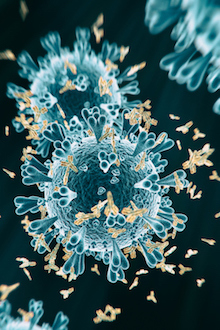
As part of an effort to strengthen genomic surveillance for emerging strains of SARS-CoV-2, the Centers for Disease Control and Prevention (CDC) has awarded a contract to Emory University researchers to characterize viral variants circulating in Georgia.
The two-year contract is part of the SPHERES (SARS-CoV-2 Sequencing for Public Health Emergency Response, Epidemiology and Surveillance) initiative, with roughly $620,000 in total costs. The principal investigator is Anne Piantadosi, MD, PhD, assistant professor of pathology and laboratory medicine, with co-investigator Mehul Suthar, PhD, assistant professor of pediatrics (infectious diseases).
Both Piantadosi and Suthar are affiliated with Emory University School of Medicine and Emory Vaccine Center. Additional Emory partners include assistant professor of medicine Ahmed Babiker, MBBS, assistant professor of medicine Jesse Waggoner, MD and assistant professor of biology Katia Koelle, PhD.
“We are analyzing SARS-CoV-2 genomes from patients in Georgia to understand the timing and source of virus introduction into our community,” Piantadosi says. “We want to know whether there have been population-level changes in the rates of viral spread, and whether there are associations between viral genotype, viral phenotype in vitro, and clinical phenotype or clinical outcome.”
With those goals in mind, the researchers plan to sequence the genomes of SARS-CoV-2 found in local COVID-19 patients. They will analyze how their specimens fit into the evolutionary landscape of SARS-CoV-2 varieties elsewhere, as well as study selected viral variants in the laboratory.
Emory is one of seven universities or research institutes with similar awards for SARS-CoV-2 genomic sequencing. The others are: Broad Institute, Yale, University of Georgia, Emory, Vanderbilt, University of Wisconsin and Scripps Institute. More information about viral sequencing and the SPHERES initiative is available here and here.
The push to strengthen SARS-CoV-2 sequencing infrastructure at Emory has been augmented through generous support from the Woodruff Health Sciences Center’s COVID-19 Center for Urgent Research Engagement (COVID-19 CURE), which has been made possible by generous philanthropic support from the O. Wayne Rollins Foundation and the William Randolph Hearst Foundation.
The COVID-19 CURE Center was created to facilitate high-impact science and discovery towards improved COVID-19 treatment and prevention research. Its goals are to invest in high-impact Emory projects in diagnostics, immunology, therapeutics, vaccines, seroprevalence, cohort development, disparities, computational studies, and other clinical research, as well as launch smaller exploratory projects that have the potential to change the clinical course or prevent the transmission and spread of SARS-CoV-2.
